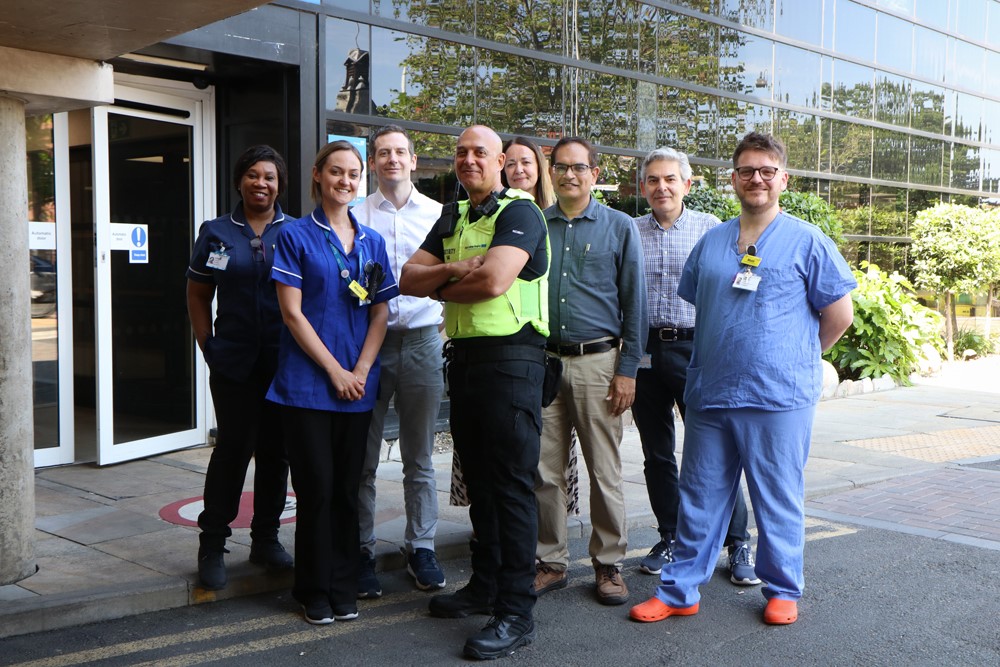King’s Security Officer back at work after recovering from a stroke
04 July 2023 - Stroke survivor Carlos Moonsam had life-saving treatment at his place of work

Carlos Moonsam, 62, from Greenwich, London, is back at work at King’s College Hospital following a potentially life-threatening stroke.
Carlos, who works as a security officer at the hospital’s Denmark Hill site, became unwell during a shift in May 2022. He said: “Out of the blue I suddenly lost my balance, and that’s all I really remember. One moment I was focussing on protecting the staff and patients in the hospital, and the next I was a patient myself in a hospital bed.
“It came as a huge shock to hear I’d had a stroke. Physical fitness is a big part of my job as a security officer, and I train every day. Stroke was not on my radar.”
A brain scan at King’s College Hospital revealed a dangerous blood clot, and Carlos was given an emergency thrombectomy to surgically remove the blockage and restore blood flow to his brain. Dr. Naga Kandasamy, Consultant Neuroradiologist at King’s College Hospital, said: “Thrombectomoy is an incredible treatment that can save patients’ lives and alleviate the devastating effects a stroke can have. Stroke is a medical emergency, and this treatment needs to be given as quickly as possible. The incredible recovery Carlos has made shows the difference it can make. It’s wonderful to see him back at work again.”
After his treatment and care from the stroke team at King’s College Hospital, Carlos has returned to work full time. He added: “Without a doubt, I am one of the lucky ones and I’m so grateful to everyone at King’s who helped take such good care of me. I wouldn’t be here without them, and now I’m back working at the place that helped save my life.”
Ian Taylor, Head of Security and Helideck Operations at King’s College Hospital, said: “Carlos is our longest serving member of the security team and is highly respected across the Trust. It was a huge shock when Carlos fell ill and I have to admit that we all thought that we may never see him back at work with us again. It is fantastic that Carlos was treated so well and has returned so quickly to the fold, as he has to be one of the kindest and committed individuals I have known.”
The main symptoms of stroke can be remembered with the word FAST:
Face – the face may have dropped on one side, the person may not be able to smile, or their mouth or eye may have dropped.
Arms – the person with suspected stroke may not be able to lift both arms and keep them there because of weakness or numbness in one arm.
Speech – their speech may be slurred or garbled, or the person may not be able to talk at all despite appearing to be awake; they may also have problems understanding what you’re saying to them.
Time – it’s time to dial 999 immediately if you see any of these signs or symptoms.
ENDS
Notes to editors
1. For further information contact: Lizzie Mills, Corporate Communications, King’s College Hospital NHS Foundation Trust. Tel: 020 3299 3850; e- mail: [email protected]
2. King’s College Hospital NHS Foundation Trust is one of the UK’s largest and busiest teaching hospitals. The Trust is recognised internationally for its work in liver disease and transplantation, neurosciences, cardiac, haemato-oncology, fetal medicine, stroke and major trauma.
3. Our hospitals include King’s College Hospital (Denmark Hill), the Princess Royal University Hospital (PRUH), and Orpington Hospital – we also provide some services at Beckenham Beacon and Queen Mary’s Hospital, Sidcup.
4. We provide care to 1.5 million patients in Southwark, Lambeth, Bromley, Bexley, Lewisham and elsewhere in south-east London and parts of Kent. In July, we launched our new strategy, Strong Roots, Global Reach, and our new vision to be BOLD.
